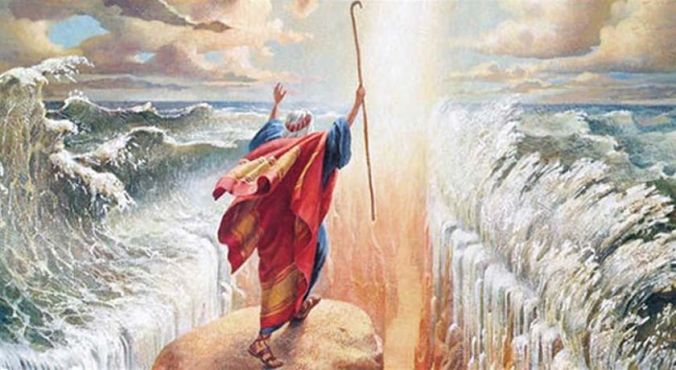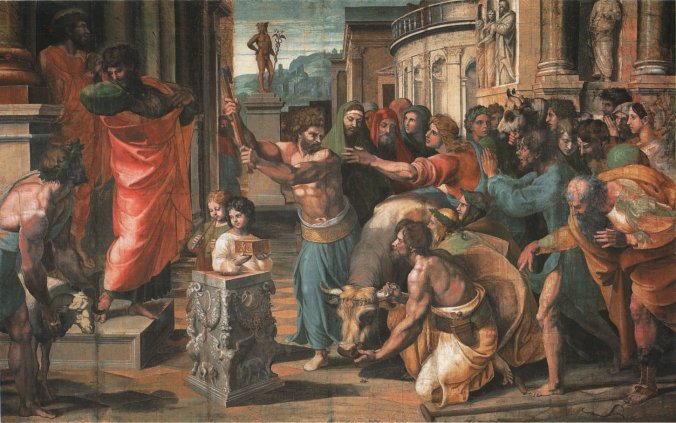- “That the blessing of Abraham might come to the Gentiles through Jesus Christ” (Gal. 3:14).
- “May God give you and your descendants the blessing of Abraham, so that you may take possession of the land where you now live as an alien, the land God gave to Abraham” (Gen. 28:4).
Those who make confident assertions about “what the Bible says” frequently overlook the presuppositions which they bring to the biblical text. James Dunn makes the excellent point that to read the Bible intelligently we must reckon seriously with “the taken-for-granteds” of both author and addressees. Where a modern reader is unaware of (or unsympathetic to) these shared assumptions and concerns, it will be impossible to hear the text as the author intended it to be heard (and assumed it would be heard). In this case (Romans, though the principle applies to any part of the New Testament), “a major part of that context is the self-understanding of Jews and Judaism in the first century...Since most of Christian history and scholarship, regrettably, has been unsympathetic, if not downright hostile to it, a proper appreciation of Paul [or Jesus] in his interaction with that self-understanding has been virtually impossible.” [1] We should not miss the amazing point that “most of Christian history and scholarship has been downright hostile” to the Jewishness of the Bible! A new approach would seem to be in order. This magazine attempts to offer you just that.
This failure to attune ourselves to the background themes of the New Testament will account for the consummate confusion that prevails about what Christianity is. Unfortunately many who approach the Bible bring to it an inbred antipathy to the Jewishness which saturates the Christian documents. Light will come when we first recognize that Gentiles have “made a hash” of trying to understand Jesus and the Apostles because of the un-Hebraic set of assumptions we start with. The Bible condemns these as “traditions learned by heart,” yet unbiblical!
Let us instead begin with a major presupposition drawn from the Old Testament: God has been working with His people to bring about a world in which justice and peace will abound (Isa. 2:1-4). To Abraham the land (and the world, Rom. 4:13) is promised forever (Gen. 13:14-15; 15:7-8; 17:8) — though he has not yet inherited it (Acts 7:5; Heb. 11:8, 9, 13, 39). To David (2 Sam. 7:13-16) the promise of a permanent dynasty, with the Messiah ruling over Israel and the world, was assured (though this has never yet been realized). The angel declares that Mary’s son is destined to assume “the throne of his father David and rule over the house of Jacob forever” (Luke 1:32). No promise could be more to the point than this simple summary of the national hopes of Israel, based squarely on the heritage they had received from the Hebrew Scriptures, uniting the promises to Abraham and David (Luke 1:55, 69, 73). The great promises of land and kingship (Gen. 12:1-5; 13:14-17; 15:18; 17:8; 2 Sam. 7:12-16) converge in Jesus as Messiah, King of Israel (John 1:41, 49; Luke 2:11: “Messiah lord”). The fulfillment of both strands of the promise will occur when Jesus returns to establish his Kingdom on the earth and take the meek to rule with him (Matt. 5:5; Rev. 5:10; 3:21; 2:26; 20:1-6, etc).
Daniel 7
In addition to these bedrock foundations of Christianity, Daniel, as a whole, and particularly his seventh chapter, supplies us with an invaluable blueprint for the New Testament story. The picture is not difficult to grasp. Hostile powers culminating in a final Antichrist will continue to persecute and wear out the saints of the Most High (Dan. 7:8, 19-21). Yet those saints will be vindicated. The time will come when the saints receive the worldwide Kingdom of God and all nations and peoples will serve and obey the saints (Dan. 7:18, 22, 27). It is against this backdrop of the divine plan in history that the New Testament drama is worked out. If we do not take account of the Messianic presuppositions of the New Testament writers, based on the covenant made with Abraham and David, we run the risk of inventing a false story, to which we add the name of Christ, but which Jesus would not have recognized as the faith.Jesus fits into the picture quite obviously when he appears as the Son of Man, the predicted Messianic figure of Daniel 7:13, who is an individual human being representing a corporate body of saints, those destined to possess rulership of the world (Dan. 7:18, 22, 27). Rooted in the promise of Daniel 7, the entire New Testament is geared to the future triumph of the saints in a renovated earth (“the Kingdom under the whole heaven,” Dan. 7:27). Jesus sums up the promise of a glorious future when he announces the Gospel about the Kingdom of God (Luke 4:43; Matt. 4:17; 9:35; see also Acts 8:12; 19:8; 20:25; 28:23, 31).
The New Testament describes the career of the “chief saint” (“holy one”), the Messiah, who gathers around himself a circle of disciple-friends. Together they announce the coming Kingdom in the face of acute opposition mostly from established religion. But other rulers are no more friendly. Existing systems of government do not wish to yield to the government of the Messiah and his followers. The theme of suffering in view of future glory pervades and permeates the New Testament: “Through much tribulation we are destined to enter the Kingdom of God” (Acts 14:22). “If we suffer with him we will also become kings with him” (2 Tim. 2:12). The saints, according to the plan laid out in Daniel 7, must expect persecution, even to death (“some are martyred,” Luke 21:16). “The horn [antichrist] wages war with the saints and overpowers them” (Dan. 7:21). The book of Revelation is the fitting summary of the Messianic story, culminating in the establishment of Messiah’s Kingdom on the earth (Rev. 2:26-27; 3:21; 5:10, 20:4, etc.).
Suffering prior to triumph at Christ’s return is reflected in the experience of Jesus and the leaders of the early Church. They are prepared to bear ignominy and shame at the hands of hostile authorities in view of the glorious prospect of being vindicated when the Messiah returns to rule: “Don’t you know that the saints are going to manage the world?” is the encouraging cry of Paul as he urges the troops forward. “And if the world is to come under your jurisdiction...” (1 Cor. 6:2, Moffat). “But the unrighteous will not inherit the Kingdom of God” (1 Cor. 6:9). This is the awful penalty which awaits the disciple who fails the test. “The inhabited earth of the future has been subjected to the saints” is the clear message of Heb. 2:5. That is what the Gospel is about (Heb. 2:2-4). On no account should the saints miss out on their destiny (Heb. 2:1). They are now to conduct themselves in a manner fitting their invitation to kingship, or as Paul puts it, “walk worthy of the God who is calling you into His own Kingdom and glory” (1 Thess. 2:12).
Throughout the gospels there are glimpses of the sparkling, brilliant future assured to the disciples. “When the world is reborn,” says Jesus, “when the Son of Man sits on his throne of glory, you who have followed me in my trials will also sit on thrones to rule over the [restored] tribes of Israel” (Matt. 19:28). “Just as my Father has covenanted a Kingdom for me, so I covenant a Kingdom to you so that you may eat and drink at my table and sit on thrones to rule the twelve tribes of Israel” (Luke 22:29-30). James and John, sons of Zebedee and cousins of Jesus, recognize the nature of the Kingdom as a real government, when they hope for chief places in the Kingdom (Mark 10:35-40; Matt. 20:20-23). Jesus does not discourage their faith in the Kingdom nor rebuke them for misunderstanding the future reign and the reality of responsibility in it! He only warns them (again with Dan. 7 in mind) that these offices will be won at the cost of service and a bitter cup of suffering.
In Revelation the drama reaches its climax. The power of Antichrist-Beast is at full strength. Yet the lamb has purchased the saints from all the nations (not just the Jews) and has formed them into a band of royal priests (following the covenant promise made originally in Ex. 19:6). “They will reign as kings on the earth” (Rev. 5:10). The same exhilarating theme reappears in Revelation 20:1-6. Even death at the hands of Antichrist cannot hinder the blessed rule of the saints.
They come alive again in resurrection after being beheaded and “begin to rule with Christ for a thousand years,” while the rest of the dead, all those who were not Christians, remain in their graves (Rev. 20:5) to await the second resurrection (Rev. 20:12).
The theme of royalty and of meteoric rise to fame and immortality at the first resurrection drives the New Testament and accounts for its irrepressible excitement. Such fervor has been dampened by the most unfortunate substitution of disembodiment in heaven at death as the Christian prospect (playing harps on clouds!). If that is what Christians may expect, there is no hope for the earth, no prospect of the nations ever beating their swords into farm implements (Isa. 2:1-4) and no hope of reigning with Christ in the new society of the coming Kingdom.
It is not surprising that Jesus concentrates his entire Gospel Message in the theme of the Kingdom of God. It was his mission to announce the Kingdom (Luke 4:43). Paul likewise sums up his whole ministry as a “proclamation of the Kingdom” (Acts 20:25). The Message has not changed. But Gentile philosophies and ideologies have continued to obscure the Davidic Messianic faith of Jesus and the early Church. Nevertheless the call of the Gospel of the Kingdom still goes out, summoning whoever wills to prepare for the privilege of ruling with Jesus in the Kingdom. “The sufferings of the present time [foreseen in the program laid out in Dan. 7] are not worthy to be compared” with the glory of the Kingdom to be “revealed in us.” A saint in the Bible is one appointed to rule with Messiah — an awesome destiny laid out in Daniel 7 as the culmination of all the Old Testament promises.
Try re-reading the New Testament with this royal motif and narrative in mind and see how it comes to life. God is one single individual (Deut. 6:4; Mark 12:29-34; John 17:3). Jesus is the Messiah, the Son of God (Matt. 16:16; Luke 1:35). The Gospel is about the Kingdom of God and Jesus (Acts 8:12; Luke 4:43; Acts 19:8; 28:23, 31). Christians are invited to reign with Messiah in the coming Kingdom. They are destined to inherit the land and the world (Matt. 5:5; 1 Thess. 2:12; Rom. 4:13). Converts were baptized in water when they received this knowledge of these basic building blocks of the Faith (Acts 8:12). This information will help to prevent us bringing our own imagined but false preconceptions to the study of Scripture.
[1] Commentary on Romans 9-16, Word Books, 1988, p. xv, emphasis added.
The above article was taken from:The Biblical Blueprint





